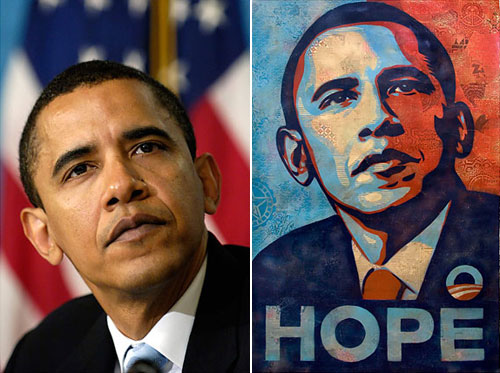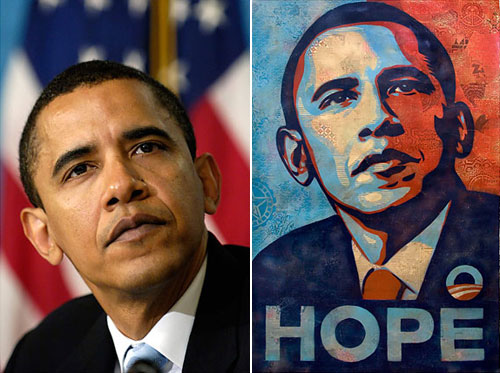
Copyrights and Campaigns blog reports:
Recently unsealed legal briefs filed by Shepard Fairey reveal that the Los Angeles artist is the "subject" of a federal criminal investigation for "potential violations" of laws prohibiting evidence tampering and perjury. According to a motion filed by Fairey seeking to postpone his deposition in the civil copyright dispute with the Associated Press over the "Obama Hope" poster, a federal grand jury is investigating whether Fairey violated 18 U.S.C. §§ 1512(c) and 1621. Section 1512 makes it a crime to "corruptly...alter[], destroy[], mutilate[], or conceal[] a record, document, or other object, or attempt[] to do so, with the intent to impair the object’s integrity or availability for use in an official proceeding; or...otherwise obstruct[], influence[], or impede[] any official proceeding, or attempts to do so."
The AP believes that this is all just legal flim-flammery by the Fairey legal team and that the Federal investigation has no bearing on their suit against him:
The AP's basic argument is that Fairey's troubles are entirely of his own making, and that "[f]or Mr. Fairey now to point to the government's investigation of his own misconduct as grounds for a discovery extension...is truly the definition of chutzpah."
Also in the legal brief is information that Fairey's lawyers believe he will face indictment in the AP case because of his choice to not incriminate himself in the Government case.
And in a rather extraordinary passage, Fairey concedes that he likely faces sanctions in the civil case for his admitted wrongdoing and may face indictment:
Mr. Fairey has already admitted engaging in misconduct and accepts that he will face sanctions by the Court at a later stage of this case. But his error, however serious, should not force him to choose between abandoning his Fifth Amendment rights and forfeiting his right to testify in this civil action and to defend the action on the merits. Of course, the Court can impose sanctions upon Mr. Fairey if it deems them appropriate, and the U.S. Attorney can choose to file criminal charges against him.
"But," he argues, "the triple punishment of potentially crippling civil liability — based not on the merits, but on his inability to testify during this particular brief period — would be unjust."
It's all extremely complicated, and must be costing both parties a shit-ton of money to battle in court over a photograph that was turned into a campaign poster.







